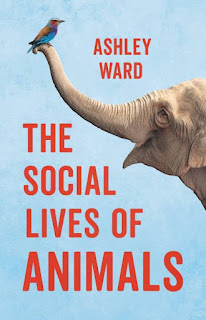 across the animal kingdom. His work has been published in top journals including PNAS, Biological Reviews, and Current Biology. He lives in Sydney.
across the animal kingdom. His work has been published in top journals including PNAS, Biological Reviews, and Current Biology. He lives in Sydney.
Ward applied the “Page 99 Test” to his new book, The Social Lives of Animals, and reported the following:
Page 99 of The Social Lives of Animals covers what a disaster shoaling has been as a strategy for a particular fish, the Atlantic cod, since it causes the animals to concentrate in one place, so making it easier for trawlers to scoop them all up. Indeed, it was this strategy, combined with some extraordinarily intensive and focussed fishing efforts, that caused the collapse of the Grand Banks Fishery.Visit Ashley Ward's website.
Given that it deals with the disastrous consequences of being social, it’s probably the single least appropriate page of all to represent the book as a whole. The content on page 99 is one of the very rare cases in which animal aggregations tend to work against the best interests of the animals, rather than in their favour. It’s the exception that very much proves the rule!
The Social Lives of Animals relates the incredibly widespread phenomenon of sociality in a swathe of different animals, from ants to chimpanzees, and describes how aspects of group living, such as co-operation and teamwork, make such a crucial contribution to the success of these animals. Working together, rather than independently, is one of the most compelling solutions to life’s challenges that has ever been devised and for so many animals, not least ourselves, it’s been invaluable. For most of their evolutionary history, group living was a recipe for success for the Atlantic cod, too. It provided them with safety in numbers, the ability to learn generations-old migration routes across the sea bed, and brought them together to spawn. Regrettably, however, this instinct to aggregate was the very thing that factory fishers were able to use against them…
--Marshal Zeringue



